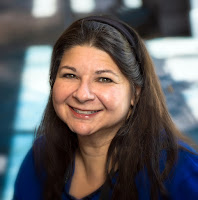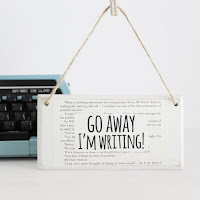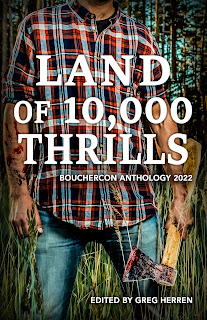A couple of years ago, I was brushing my teeth, getting ready for bed, thinking how grateful I was that in our current home, my beagle/basset dog, Jingle, couldn't escape from our backyard. Things had been different at our prior home. The six-foot-high split-rail fence in the backyard had wire over it, and that wire was secured into the ground, so you'd think Jingle would have been contained. But where other dogs would see an obstacle, Jingle saw a challenge.
Regularly, he pushed at the wire, testing it for weak spots at ground level, then shoved through when he could. Friends nicknamed him Houdini. Over and over, I took steps to prevent Jingle from escaping, but he kept besting me. One day, after yet another escape, my good friend Donna Andrews (yes, Donna Andrews the author, who lived two miles away from my old house) suggested I buy some large heavy rocks to put on both sides of the fence wherever it was weak. She was going to the garden store and could pick them up for me. I said, yes, please. Soon, I found myself the proud new owner of a lot of rocks.
 |
| The dog otherwise known as Houdini |
So, circling back to the start of this story, I was brushing my teeth and thinking about how Jingle used to escape from the backyard at our old house. After spitting my toothpaste out, I said, "Before I owned a dog, I never would have imagined I'd spend $37 on ROCKS." (Yes, I often talk aloud to myself.) Then I started thinking of all the other things I never would have done before I owned a dog, like buy a pink pig outfit--that was for my prior dog, Scout. It had been October when I adopted him, and that was the only extra-large Halloween costume I could find at that late date.
My old neighborhood had a Halloween party each year in our cul de sac, and when I took Scout that first year, one of the neighbors laughed at him--not with him, at him--trying to make me feel bad for dressing my large male dog in a pink pig costume. I brushed it off, but all these years later, I remember. So, I was thinking about all of this as I finished getting ready for bed that night, and my writer's brain kicked in. What if I created a character who adopted an escape-artist dog? And what if she had a mean neighbor who did worse than laugh at the dog? What might she do next? And "The Joys of Owning a Dog" was born.
 |
| Look how cute he was! |
Thanks to editor Michael Bracken for publishing the story. You can read it in issue 13 of Black Cat Mystery Magazine, released last week in trade paperback. You can purchase it by clicking here. The ebook should be out soon. The issue also includes stories from fellow SleuthSayers Eve Fisher and John Floyd, which I'm looking forward to reading.
And now, I have to go. Jingle is demanding royalties for partially inspiring this story. Thankfully, he takes his payment in treats.

.jpg)


























